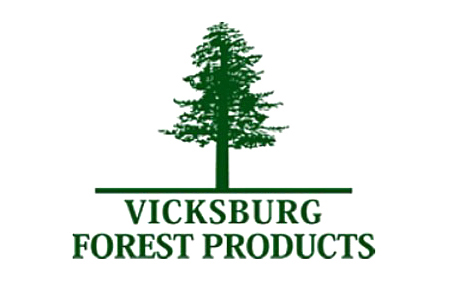Summary Results
- Streamlined Operations
- Accurate Reporting
- Increased Profitability
- Improved Communications
- Reduced Errors
- Reduced Overhead
Navigating the Complex World of Lumber Processing
In the dense woods of rural Mississippi, a Vicksburg Forest Products faces the intricate challenge of turning raw logs into market-ready products. The process involves not only storing and cutting logs but also understanding the nuanced factors of moisture content, board lengths, and lumber grades.
To accomplish this, the plant’s operations, crucial for optimizing yield, relied heavily on estimations, handwritten notes, and manual data entry into Excel sheets. This cumbersome approach, more often than not, resulted in inefficiencies, miscounts, and a lack of accurate data, impeding the company’s ability to operate at its full potential. With a two-week turnaround time to convert raw logs into finished products, the need for a streamlined and automated solution became increasingly evident to stay competitive in the market.
The Problem: Unraveling the Challenges of Manual Operations
In the heart of this lumber yard, operators and estimators grappled with the cumbersome task of manually tracking the movement of logs. This process entails tracking several forklift operators as they pick up lumber across a 10+ acre lumber yard in multiple locations and deliver the wood to a central location. Once collected, the drivers must begin the cumbersome process of taking their load to the central operating building to verify the inventory before it is approved for processing. This verification process alone can cost each forklift driver (and Vicksburg Forest Products) delays of 20-40 minutes per load. This tracking method, reliant on manual counts and paper documentation, led to inaccuracies in crucial metrics such as board lengths, lumber grades, and cut lengths. Compounded by the labor-intensive nature of the work and the remote location, the inefficiencies created a logistical nightmare. And this is when the process goes smoothly!
To exacerbate matters, the industrial nature of the area posed additional challenges. Six different networks operating on the same flat network, without VLAN control, introduced interference and wear and tear on the network infrastructure. The heavy machinery, dust, grind, and sawdust in the air further complicated the establishment of a robust and reliable network.
To add to the complexity, the entire process took place in a remote, industrial area of rural Mississippi, devoid of any existing network infrastructure for Wi-Fi. The absence of a strong network further hindered the implementation of the Legna Tallyworks software, which required seamless Wi-Fi coverage for pickers and forklift operators throughout the plant. The harsh industrial environment, with its dust build-up and sawdust, posed a threat to traditional network infrastructure. Identifying suitable locations for wiring became crucial to prevent damage from heavy machinery and environmental factors. The sheer size of the area compounded the challenge, making the cost of providing comprehensive coverage a significant factor.
The Solution: Pioneering Efficiency with Legna Tallyworks Software and Advanced Network Infrastructure
In response to these multifaceted challenges, the R3 Project Team orchestrated a comprehensive solution that would modernize the operations of Vicksburg Forest Products. Collaborating with Stanley, a renowned network infrastructure team, we strategically placed indoor access points, implemented additional network infrastructure, and incorporated large-scale outdoor arena access points. This intricate setup not only provided comprehensive Wi-Fi coverage but also ensured the Legna Tallyworks software could function optimally, allowing real-time tracking of products via tablets.
The implementation of the Legna Tallyworks software emerged as the linchpin of the solution, offering a sophisticated platform for tracking and managing every stage of the lumber processing journey. This transformative tool, accessible via tablets, eliminated the need for manual tracking methods, providing live, accurate metrics of productivity and inventory. The solution not only saved valuable time but also offered a transparent and real-time view of the product lifecycle, from the raw log entering the plant to the final product ready for sale. The simple process of allowing for forklift operators to account for their inventory remotely via tablet and not forcing them to carry their load to a central HQ for counting is saving each driver hours on their day and increasing the overall throughput and production of each driver.
By partnering with Stanley and deploying advanced network infrastructure, R3 not only addressed the initial challenges posed by the lack of network coverage but also future-proofed the client’s operations against potential disruptions. The Legna Tallyworks software, seamlessly integrated into the newly established network, allowed for streamlined communications, efficient reporting, and enhanced decision-making capabilities. The client’s workforce, now equipped with tablets connected to the robust network, experienced a paradigm shift in operational efficiency.
This newfound efficiency not only optimized the entire lumber processing workflow but also allowed for more accurate budgeting and forecasting. With precise operational costs and projections, the client could make informed decisions, ultimately translating into increased profitability. The MSP’s intervention not only served as a solution to immediate challenges but also positioned the lumber yard for sustained success in an industry that demands precision and efficiency.


